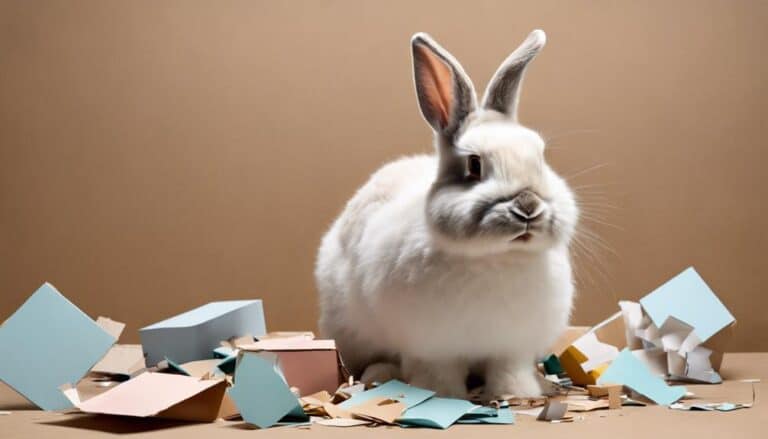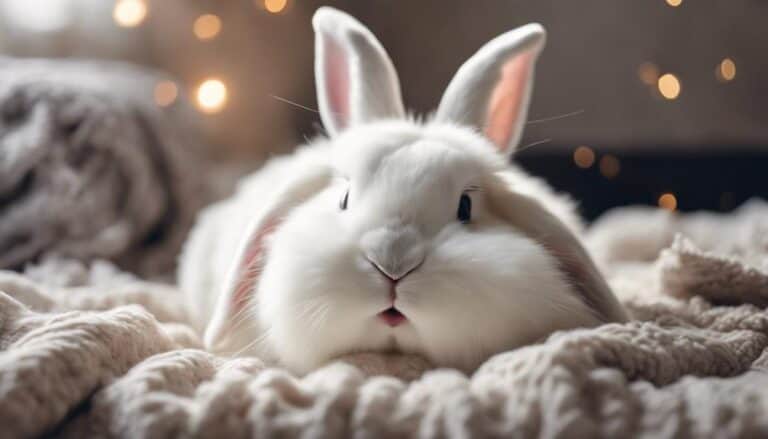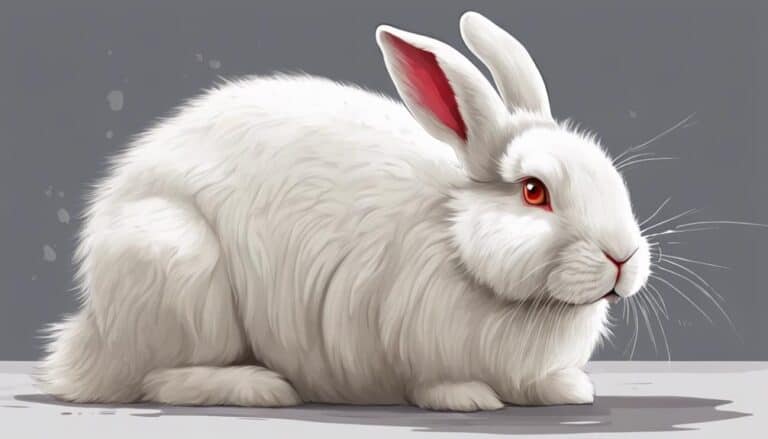Rabbits are prone to a potentially life-threatening condition called bloat. In fact, up to 10% of rabbits may experience it at some point in their lives. Bloat occurs when gas builds up in a rabbit’s digestive system, leading to severe abdominal discomfort and a potentially dangerous situation if not addressed promptly. It is crucial for rabbit owners to be aware of the symptoms, such as a swollen abdomen and reduced appetite, and to seek veterinary care immediately if they notice any signs of distress. For more information on health risks affecting rabbits, including a rabbit hemorrhagic disease overview, pet owners should consult their veterinarians to ensure their pets receive the best care possible.
So, what causes this condition?
One key factor is their diet. Rabbits are herbivores, which means they primarily eat plant-based foods. However, their digestive system is sensitive, and any sudden changes to their diet can lead to bloat.
Another crucial aspect is the unique anatomy of a rabbit's digestive system. Rabbits have a large cecum, a pouch-like structure that houses a diverse range of microbes. These microbes help break down and extract nutrients from plant material. However, if the balance of these microbes is disrupted, it can cause gas to build up, leading to bloat.
If left untreated, bloat can have serious consequences, including death. It's essential for rabbit owners to be aware of the potential causes and take preventative measures to minimize the risk of bloat in their pets.
Contents
- 1 Key Takeaways
- 2 Factors Leading to Rabbit Bloat
- 3 Impact of Diet Changes on Rabbits
- 4 Role of Exercise in Preventing Bloat
- 5 Understanding the Stress Factor
- 6 Fatal Consequences of Rabbit Bloat
- 7 Inability to Vomit in Rabbits
- 8 Abdominal Swelling and Cardiovascular Failure
- 9 Urgency of Veterinary Intervention
- 10 Time-Sensitive Nature of Bloat in Rabbits
- 11 Conclusion
Key Takeaways
So, what causes rabbits to bloat and die? Well, it usually comes down to two main culprits: a poor diet and stress. When a rabbit's digestive system isn't working properly, it leads to a buildup of gas.
This gas buildup, also known as bloat, is really dangerous because it restricts blood flow. And when that happens, it can cause some severe health complications. One of the reasons bloat is so risky for rabbits is that they can't vomit. Unlike humans, who can throw up to get rid of something that's not agreeing with them, rabbits are stuck with whatever is in their stomach.
Sometimes, bloat can lead to gastric torsion, which is when the stomach twists and cuts off its own blood supply. This is an emergency situation and can be fatal if not treated quickly. If you suspect your rabbit has bloat, it's essential to get them to a vet as soon as possible. Timely intervention can mean the difference between life and death.
Factors Leading to Rabbit Bloat
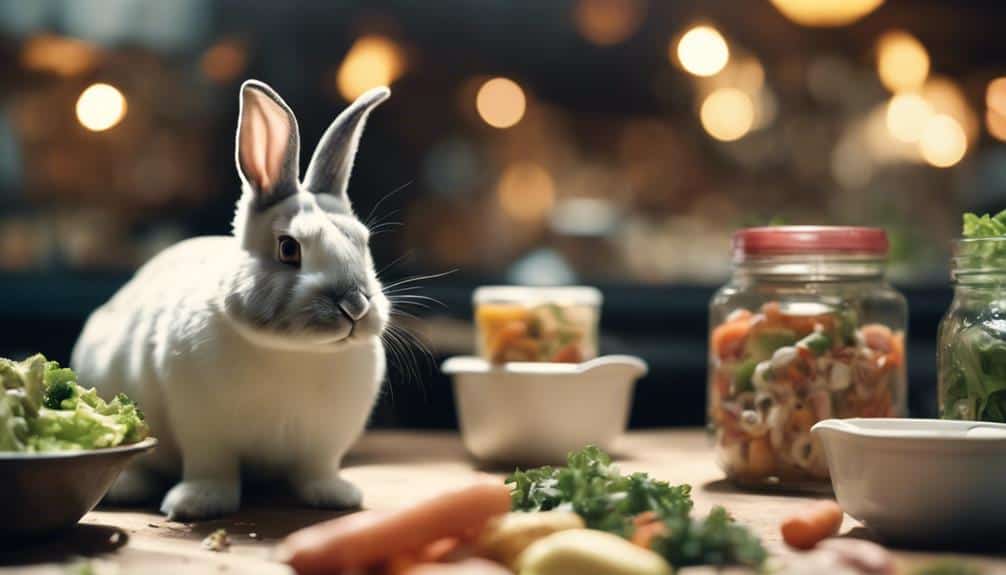
Rabbits are prone to bloat because of their unique digestive system. Their stomach is a delicate part that's easily affected.
Unlike other animals, rabbits have a single entrance and exit to their stomach, which makes it hard for them to get rid of gas by vomiting or burping.
When the stomach gets too full of gas, it puts pressure on the blood vessels in the abdomen, restricting blood flow. This can lead to serious problems if not addressed quickly.
One common reason for bloat in rabbits is hairballs, also known as trichobezoars. These hairballs can build up in the stomach and block the exit to the intestine, causing a backup of food and gas.
Another reason for bloat is intestinal obstructions. This can happen when foreign objects, tumors, or post-surgery adhesions block the normal flow of digestion. As a result, rabbits can experience bloat.
Impact of Diet Changes on Rabbits
When you make changes to your rabbit's diet, you need to be careful. Their digestive system is delicate, and sudden changes can cause serious problems like gastric dilation.
One of the main reasons this happens is because of high-carbohydrate, low-fiber diets. These types of diets can cause gas and fluid to build up in the stomach, leading to gastric dilation.
So, what can you do to avoid this?
The key is to introduce new foods gradually, in small amounts.
It's also important to prioritize a diet that's rich in fiber and low in carbohydrates, tailored to your rabbit's specific nutritional needs.
Diet and Digestive Health
Diet changes can significantly affect your rabbit's digestive health. The food your rabbit eats can really impact the balance of gut bacteria and the risk of bloat.
A diet rich in high-quality hay is essential for a healthy digestive system. Fiber helps regulate the movement of food through the gut, which can prevent issues like bloat.
Foods high in sugar and starch should be avoided as they can disrupt the gut microbiome and lead to digestive health problems. Instead, opt for a diet that's low in sugars and starches to promote a healthy balance of gut bacteria.
A balanced diet is key. Give your rabbit a mix of fresh veggies, limited amounts of fruit, and pellets. This will ensure they're getting all the essential nutrients they need, while also supporting top-notch digestive health.
Risks of Sudden Changes
So, one thing you should definitely avoid is making sudden changes to their diet. These can really mess with their gut microbiome, which can lead to some serious problems like bloat and other digestive issues.
Rabbits have super sensitive digestive systems that rely on eating a consistent amount of fiber to function properly. If you suddenly switch them from a high-fiber diet to a low-fiber diet, it can throw off the balance of good bacteria in their gut. This can cause a buildup of gas and potentially lead to bloat.
Feeding your rabbit foods that are high in sugar, starch, and carbs can also be a problem. These types of foods can help bad bacteria grow in their digestive system, which can make the risk of bloat and other digestive issues even higher. And if your rabbit isn't getting enough fiber, it can slow down the movement of food through their digestive tract. This can cause gas and fluids to build up in their stomach, which can contribute to bloat.
Make sure to introduce any changes to your rabbit's diet gradually, and always prioritize a high-fiber diet to support their digestive health and prevent potential complications.
Role of Exercise in Preventing Bloat
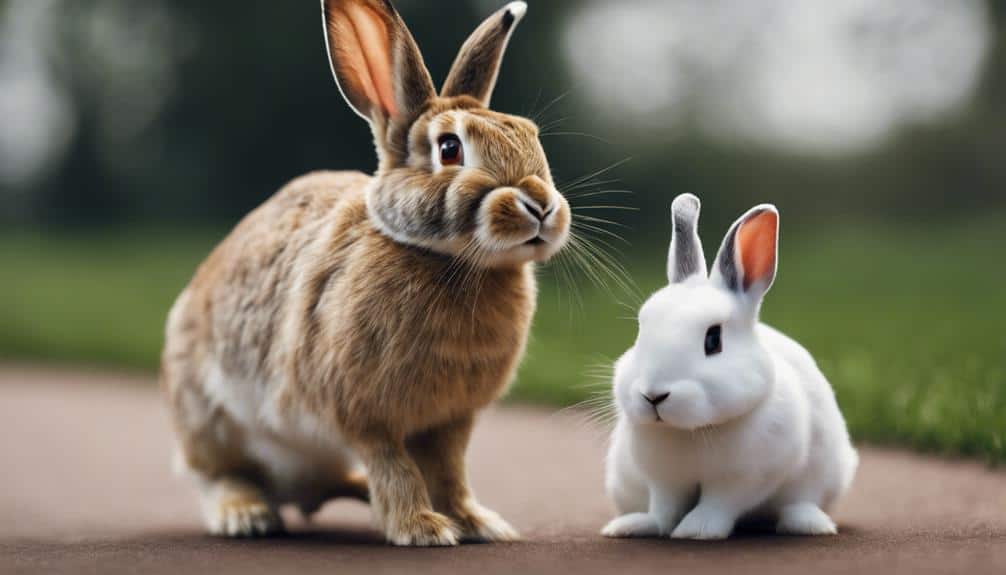
Regular exercise is crucial in preventing bloat in rabbits. It does this by helping with digestive motility and gas expulsion.
When rabbits exercise, it stimulates their digestive system. This helps with regular bowel movements and prevents gas from building up, which can lead to bloat.
Exercise also helps food move smoothly through the digestive tract, reducing the chances of fermentation and gas formation.
Exercise also enhances gut motility. This means that food moves efficiently through the gastrointestinal tract, reducing the likelihood of it stagnating in the gut and contributing to bloating.
Regular exercise not only helps prevent bloat, but it also contributes to a rabbit's overall health and well-being.
A healthy, active rabbit is less prone to digestive issues, including bloat.
This makes exercise an essential part of their care routine.
Understanding the Stress Factor
Stress is a major contributor to rabbit bloat because it affects their digestive system and gut health. When rabbits get stressed, it can change how their gut works, leading to issues like gastric dilation. This is when their stomach fills up with gas and fluid, causing bloating that can be deadly if not treated.
So, what're the signs that your rabbit might be experiencing stress-induced bloat? They might seem restless, eat less, or have a swollen belly. You might also notice them grinding their teeth or hunching over in discomfort.
If you think your rabbit has bloat because of stress, you need to get them to a vet ASAP. The vet can give them the right treatment, which might include relieving the pressure in their stomach, giving them fluids, managing their pain, and figuring out what's causing the stress in the first place.
The faster you act, the better for your rabbit's health and well-being.
Fatal Consequences of Rabbit Bloat
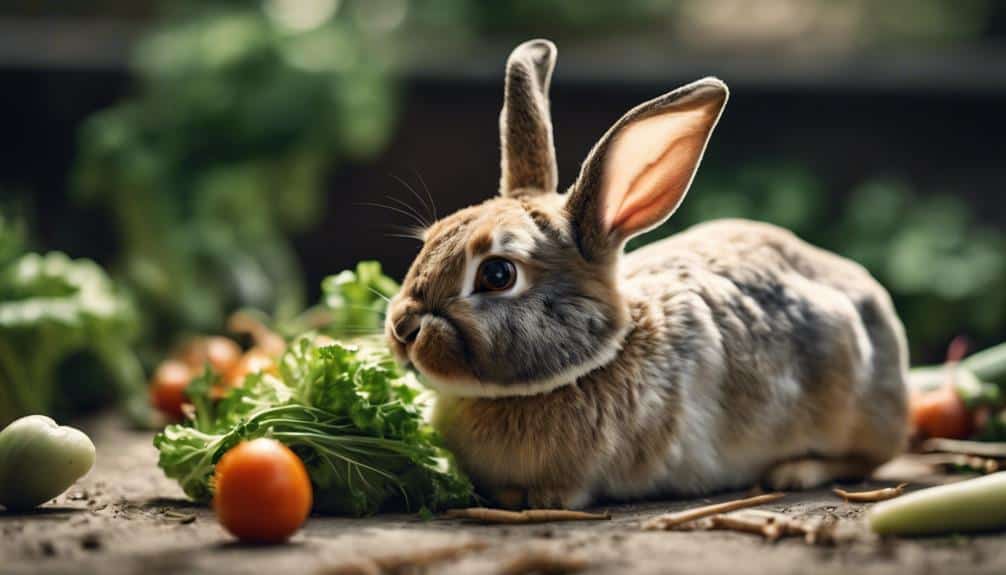
Rabbit bloat can have dire consequences if left untreated for an extended period of time, potentially leading to severe health complications or even death. When a rabbit experiences bloat, the stomach enlarges due to excessive gas accumulation or an obstruction caused by various factors, such as inadequate diet or stress.
The pressure from the bloated stomach can lead to internal damage, affecting other organs and disrupting their normal functions. This can be a major problem because the organs in a rabbit's body work together, so if one is damaged, it can cause a chain reaction of health issues.
As the stomach expands, it can put pressure on the diaphragm, making it challenging for the rabbit to breathe properly. This can be very scary for the rabbit, and it's crucial to get it treated as soon as possible.
Severe bloat increases the risk of gastric torsion, where the stomach twists on itself, cutting off blood supply and leading to tissue death. This is often fatal if not promptly addressed.
It's essential to recognize the signs of bloat and get your rabbit to a vet right away if you suspect it's happening. These consequences highlight the importance of recognizing and promptly treating rabbit bloat to prevent serious health issues or potential fatality.
Inability to Vomit in Rabbits
Rabbits can't vomit because of a special valve near their stomach.
This makes them more prone to digestive problems like bloat.
This unique anatomy puts rabbits at risk of gastric dilation, which is a serious health issue.
When gas or fluid gets trapped, they can't expel it, and that can lead to big problems.
The fact that rabbits can't vomit means they're more likely to get bloat.
This is why it's crucial to recognize the symptoms early and get them to a vet right away.
No Rabbit Vomiting Reflex
Rabbits can't vomit because of the way their bodies are put together. Specifically, their lower esophageal sphincter is designed in a way that doesn't allow them to throw up. This has its advantages – it helps prevent them from inhaling food or liquids when they swallow. However, it also creates some risks.
For instance, if a rabbit's stomach gets too full of gas or food, it can't get rid of it by vomiting. This can lead to a condition called gastric dilation, which can be very dangerous.
Their lower esophageal sphincter acts like a strong barrier that doesn't let the stomach contents flow back up into the esophagus.
Because they can't vomit, rabbits can't get rid of extra gas in their stomachs, making them prone to bloating, which can be life-threatening.
And if a rabbit eats something it shouldn't, like a foreign object, it can't cough it back up, which increases the risk of a blockage in the intestines.
This means that it's crucial to keep a close eye on your rabbit's health and get them to a vet right away if you notice any signs of distress or illness. Their condition can go from bad to worse very quickly because they can't vomit.
Digestive System Vulnerability
Rabbits have a unique digestive system that makes them super vulnerable to a serious condition called gastric dilation and bloat. This can be really dangerous for their health.
The reason for this is that their stomach has only one way in and one way out. So, if there's a blockage, any gas or fluid that builds up can't escape. This can lead to a buildup of gas in the stomach, which contributes to bloat.
Another problem is that rabbits can't burp very well. This means that gas can build up in their stomach, making bloat even more likely.
The way their digestive system is designed, with a big cecum and a long intestinal tract, also makes them more prone to digestive issues. This makes them even more susceptible to bloat.
And to make matters worse, rabbits can't vomit. So, if there's a blockage in their digestive system, it can quickly become a life-threatening case of bloat.
Here's a breakdown of why rabbits are so vulnerable to bloat:
| Fact | Detail | Implication |
|---|---|---|
| Single entry and exit in the stomach | Fluid and gas accumulation has no escape route if there is a blockage. | Increased risk of gastric dilation and bloat due to the inability to expel trapped gas and fluid. |
| Inability to burp effectively | Gas buildup in the stomach may occur, contributing to bloat. | Lack of gas expulsion mechanism heightens the risk of bloat in rabbits. |
| Large cecum and long intestinal tract | Complex digestive system structure makes rabbits more prone to digestive issues. | Susceptibility to bloat is heightened due to the intricate anatomy of the rabbit's digestive system. |
| Lack of vomiting reflex | Obstructions in the digestive system can lead to severe and life-threatening bloat. | Inability to vomit increases the danger of blockages causing bloat, requiring immediate veterinary intervention. |
Abdominal Swelling and Cardiovascular Failure

Abdominal swelling in rabbits can be a serious and potentially life-threatening condition, especially when it's accompanied by cardiovascular failure.
So, what happens when this occurs?
Well, several key factors come into play.
First, the rabbit's belly may appear visibly swollen and tense, indicating a buildup of gas or fluid within the abdominal cavity. This distension can lead to discomfort and difficulty in breathing for the rabbit.
As the condition worsens, the rabbit may become weak and lethargic.
This is because cardiovascular failure means the heart is struggling to pump blood effectively, resulting in a decreased oxygen supply to essential organs. In severe cases, this can even cause the rabbit to collapse.
Another telling sign is the appearance of the mucous membranes inside the rabbit's mouth.
If they appear pale or bluish, it's a visible indicator of poor circulation resulting from cardiovascular issues. This is a clear sign that the rabbit needs urgent veterinary attention.
Recognizing these signs promptly and seeking veterinary intervention is crucial in managing abdominal swelling and cardiovascular failure in rabbits.
Urgency of Veterinary Intervention
If your rabbit has gastric dilation, it's crucial to get them to a vet right away. This condition can quickly become life-threatening if left untreated, and delaying vet care can lead to severe complications like heart problems, breathing difficulties, and even death.
The longer you wait, the higher the risk of your rabbit dying. In fact, some rabbits can die within 24 hours of showing symptoms if they don't get prompt treatment. That's why it's so important to find a vet who's experienced in caring for rabbits.
They can provide the necessary care, including decompressing the stomach, giving fluids to treat dehydration, and managing pain to reduce suffering.
Time is of the essence when it comes to treating gastric dilation in rabbits. If you notice any signs of illness, such as lethargy, loss of appetite, or a swollen belly, don't hesitate to seek professional help.
The sooner your rabbit gets veterinary attention, the better their chances of recovery will be.
Time-Sensitive Nature of Bloat in Rabbits
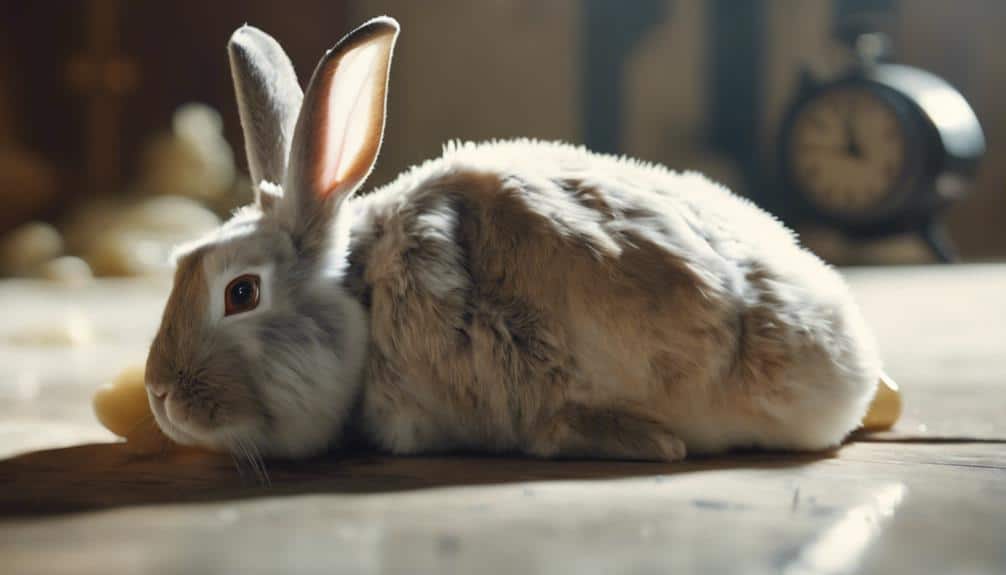
If your rabbit is experiencing bloat, time is of the essence. This is a life-threatening condition that requires immediate attention.
When it comes to evaluating the severity of bloat, monitoring your rabbit's blood glucose levels is crucial. Rapid changes in blood glucose levels can indicate metabolic imbalances that need to be addressed right away.
The rapid increase in the size of your rabbit's abdomen is a concerning sign that requires immediate action. As bloat progresses, the distension of the abdomen can put pressure on essential organs, leading to further complications. The longer you wait, the more severe these complications can become.
The sooner you identify bloat, the sooner you can start treatment. This may include decompression procedures, fluid therapy, and medications to alleviate gas buildup and restore normal gastrointestinal function. Delaying treatment can exacerbate the condition, potentially leading to severe consequences. The clock is ticking, so don't wait – seek veterinary attention right away if you suspect your rabbit has bloat.
Conclusion
Rabbit bloat is a serious condition that can quickly turn deadly if not treated promptly. It's essential to understand what causes it and take preventative measures to keep your furry friend safe.
A rabbit's diet plays a significant role in bloat. Feeding them high-quality pellets, hay, and veggies can help prevent this condition. Make sure they've access to plenty of fresh water and exercise opportunities to keep their digestive system running smoothly.
Stress is another factor that can contribute to bloat in rabbits. Minimize changes in their environment, provide a calm atmosphere, and handle them gently to reduce stress.
Monitor your rabbit's behavior and watch for signs of abdominal swelling, discomfort, or lethargy. If you notice any of these symptoms, don't hesitate to take your rabbit to the vet. Quick action can mean the difference between life and death. Remember, bloat can escalate rapidly, so stay vigilant and prioritize your rabbit's health.

